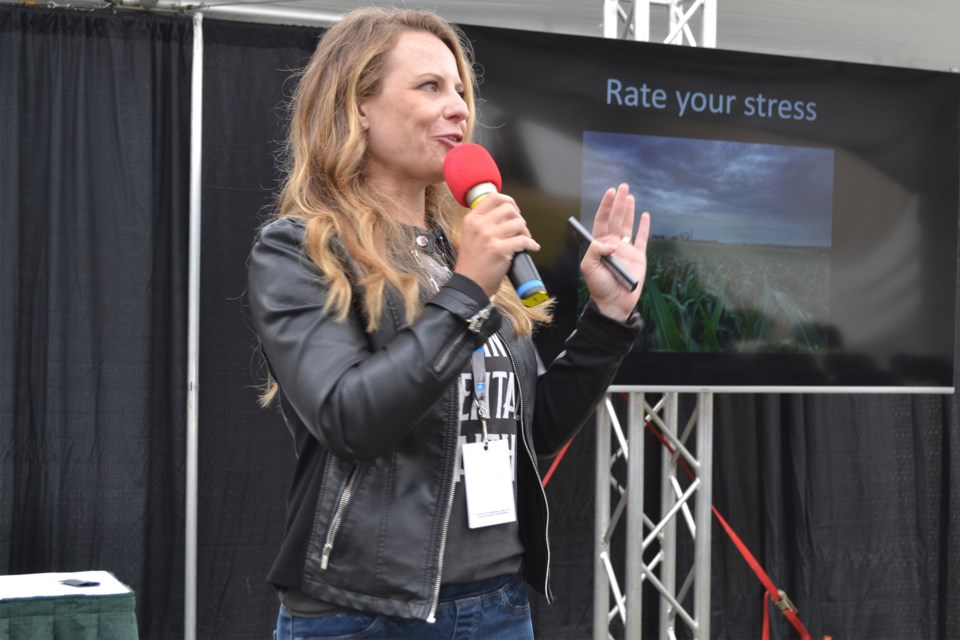OLDS — It’s OK to not be OK.
That’s one of the main mantras of Lesley Kelly, a Saskatchewan farmer who provides advice on mental health in general and for farmers and their families in particular.
Kelly spoke during AgSmart, a two-day event held recently at the Olds College Smart Farm to showcase the latest in agriculture; especially computerized agricultural technology.
Kelly and her family farm near Watrous, Sask.
When Kelly and her husband Matt got back into farming after living in Alberta, they found out firsthand how much they loved farming, but how stressful it can be.
That led to some big changes.
High Heels & Canola Fields was founded. It’s a blog that discusses agriculture and brings farmers and consumers and farmers together. Kelly has been described as its “heart and soul.”
She also helped found the Do More Ag Foundation, which aims to achieve many of the same goals.
Kelly has also served on the national Bell Let’s Talk campaign regarding mental health, and was elected as one of three new board members to the Saskatchewan Wheat Development Commission.
She received a Women of Distinction award from the Regina YWCA for her efforts.
Kelly and Matt have two young sons.
“My family, we’ve gone through some really, really hard times, both in farming and within our personal lives,” Kelly said.
“Our lentils fared well, but we know our wheat hasn’t been doing well in the drought. And then also, I lost my dad recently to a battle with cancer.
“We’ve learned that, by learning more about our mental health, by learning how to talk about what we need around the conversation of mental health, knowing how we can support each other and ourselves has helped our farm and our family go through those hard times together.”
Kelly said the transition back to the farm wasn’t an easy one.
“There was so much rain that we lost roads, we lost about a quarter of land and our farm went into financial hardship,” she said.
“My husband and I, when we were going through hard times, we didn’t know where to go or who to talk to. We were afraid to talk about it.”
Soon they found they had no choice but to talk about it, to reach out to mental health professionals in order to receive advice and gain skills for coping with stress, a major factor in mental health.
Not all stress is bad, Kelly said, adding it can motivate people to get things done.
However, “when stress can become overwhelming and negative is when we don’t give ourselves the time to recover and recharge and then that can lead into the risk, the high risk, of having mental health issues or physical problems as well."
Kelly said signs of stress differ from person to person but can include clenched teeth, insomnia and loss of appetite.
“If your signs of stress are very, very high, you could have a high risk of having suicidal thoughts," she said.
Kelly said farmers have to learn that some things – like divorces, deaths – and weather – are out of their control.
The Kelly family learned that a key to coping with that stress is to talk about it with each other.
One tool is to give the level of stress a number, so others know how you’re feeling and can help you find ways to de-stress, at least to some degree.
“If I know that my husband’s at a 10, I can help support him or we can start to talk about it. Because even by him sharing that he’s a 10, even that weight can be lessened,” she said.
Disagreements will happen, Kelly said, but the key is to look for ways to find speak constructively and find common ground – solutions.
"We use humour a lot,” she said. “We ask for direction and clarity. We look for ways to make agreements and commitments and we take responsibility for our actions.”
“Our family comes first in everything; in all of our decision. And then it’s the farm, and then it’s the financials,” she said.
Another key, said Kelly is to do things for yourself that will help relieve stress. Those things can be different for each person.
“I know when we first started talking about self-care on the farm, my husband and my brother were, ‘Lesley,’ they said, ‘don’t make us do bubble baths and yoga.’
“For me, that’s what I need — or a couple of things that I learned to do. But for them, it’s very, very opposite.”
She recommended taking breaks if stressed.
In those cases, her husband sometimes gets off the tractor or combine and literally runs around. During his off hours, he likes to lift weights or hang out with their sons on the outdoor rink. She often takes walks or goes cross-country skiing.
They’ve also found that social interaction – hanging out with friends or the kids and having a few good laughs – is very important and therapeutic.
Showing affection is very important, as is finding outlets for creative expression.
Another tip, passed on from her father, is to find at least three positive things that happened or that you’re grateful for each day. They can be as mundane as simply getting up in the morning.
She urged the audience to take advantage of the help mental health professionals can provide.
"Know that it’s OK to go through those hard times and that there is support and resources out there and it does – and it can – get better,” Kelly said.
“I’m a testament to that, my family’s a testament to that and our farm is a testament to that.”



